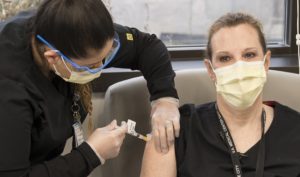
Earlier this year, ER Registered Nurse Pamela Makris was the first employee to receive the COVID-19 vaccine at the Salt Lake City VAMC. Now, the VA is requiring all frontline healthcare workers to get shots. Photo from Feb. 10, 2021, VAntage Point blog
WASHINGTON — When the VA, the largest healthcare system in the U.S., mandated COVID-19 vaccines for front-line healthcare workers in late July, it moved to the forefront of a building trend to require COVID-19 vaccines for some employees. It also established the department as the first federal agency to take the step.
The VA will require more than 115,000 healthcare workers such as physicians, dentists, podiatrists, optometrists, nurses, physician assistants, chiropractors and dental assistants who work in or visit VHA facilities or treat veterans who receive care through the VA to become fully vaccinated within the next eight weeks, if they have not already completed the immunization process. The department is offering those providing proof of vaccination four hours of paid administrative leave.
The decision comes as the more transmissible Delta variant (B.1.617.2) drives up cases across the country, leading to a more than sevenfold increase in less than four weeks. The rapidly spreading variant was responsible for more than 7 out of 8 cases in the United States in July. That was, in part, because the Delta variant is 50% more contagious than the Alpha variant that dominated in the winter surge, which itself was 50% more contagious than the strain that spread worldwide in the spring of 2020.
For the VA, the more-important characteristic of the Delta variant is its apparent increased severity. Individuals with the new strain have roughly 1,000 times as much virus in their lungs as those who contracted COVID-19 in 2020 and may be twice as likely to require hospitalization. That makes it a matter of great concern to those caring for veterans, who tend to be older and have comorbidities that increase their risk of severe disease.
“We’re mandating vaccines for Title 38 employees because it’s the best way to keep veterans safe, especially as the Delta variant spreads across the country,” said VA Secretary Denis McDonough. “Whenever a veteran or VA employee sets foot in a VA facility, they deserve to know that we have done everything in our power to protect them from COVID-19. With this mandate, we can once again make—and keep—that fundamental promise.”
The VA also noted that the vaccine mandate would protect its workforce, a point driven home by the deaths of four employees from COVID-19 in recent weeks. None of the employees who died had received the vaccine; three contracted the Delta variant. In addition, the VA recently reported its third outbreak of the pandemic among unvaccinated employees and trainees at the VA Law Enforcement Training Center.
“My goal has been that, by August, we are in a position to make clear that we are providing more care and more benefits than before the pandemic,” said McDonough at a June press conference. “Our ability to do that is enhanced by our ability to get more workers vaccinated.”
Support for Mandates
Multiple trends provide backing for the department’s decision to require vaccines among healthcare workers. On the same date as the VA announced its requirement, nearly 60 medical groups signed a joint statement urging mandated COVID-19 vaccinations for all healthcare workers. The signatories included prominent medical organizations such as the American Hospital Association, American Medical Association, American Nurses Association, the National Association for Home Care and Hospice and multiple infectious disease societies.
“Due to the recent COVID-19 surge and the availability of safe and effective vaccines, our healthcare organizations and societies advocate that all healthcare and long-term care employers require their workers to receive the COVID-19 vaccine,” while recognizing that a small percentage of healthcare professionals may not be able to be immunized for medical reasons, the medical organizations stated. “This is the logical fulfillment of the ethical commitment of all healthcare workers to put patients as well as residents of long-term care facilities first and take all steps necessary to ensure their health and well-being.”
Medical professionals have been hit hard by the virus, but many have resisted getting their own shots. Nearly 40% of workers in long-term care facilities remain unvaccinated, as do 1 in 4 hospital workers with direct patient contact, according to an analysis of data from the Department of Health and Human Services. While some hospitals and healthcare systems have mandated the vaccine for their healthcare workers, including the Mayo Clinic and Houston Methodist Hospital, others reported that less than 60% of their medical staff had received their jabs.
The mandates received support from the Equal Employment Opportunity Commission. In May, the commission concluded that federal laws do not prevent an employer from requiring vaccination of employees who are physically present at a worksite. That same month, a federal judge sided with Houston Methodist and dismissed a case challenging mandated vaccines brought by some of its employees. Other judges have followed suit, ruling that employers are free to impose the requirement as a condition of employment, and workers are free to quit if they do not want to be immunized.

